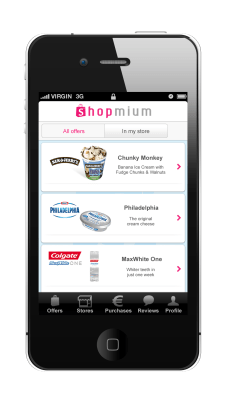Shopmium has closed a $5.6 million Series B funding round, with backing from Ventech, Accel Partners and ISAI, to roll its product discovery apps into new markets — pushing outside its home market of France. The funding is the second swathe of external financing for the startup, with Accel and ISAI kicking in $2.1 million back in 2011. Prior to that the founders also invested undisclosed seed funding.
Shopmium co-founder and CEO Eli Curetti told TechCrunch the startup plans to launch in one new market later this year and a second market next year. He said it’s still undecided on exactly which markets it will expand to but said the likely candidates are the U.K. and the U.S.
Since launching around 18 months ago, Shopmium has amassed around 550,000 users in France (it’s on Android and iOS), and has attracted campaigns from 140 brands. It’s using a neat trick to reduce consumer hassle relating to redeeming coupons by refunding the discount direct to the purchaser. This also means it’s disintermediating the retailer in the process — so its business is based on direct commercial relationships with brands themselves. Shopmium’s app actually acts as an advertising platform where brands can run rich media campaigns to an audience of users who have opted in to hear about new products — the main incentive from the consumer side, apart from targeted product discovery, being the chance to access discount coupons after viewing the ads.
“Mobile couponing is not the centre of it. The centre of it is product discovery. The way it works is we give to the brands the opportunity to advertise their products to our audience. They decide to run mobile campaigns, and it’s mostly the type of campaigns that have either a rich image or a video or any kind of brand experience, and if you click through that advertisements you get to a drive to store and coupon page. But the main element is the product discovery element, and that’s what we are selling,” says Curetti. “We’re not selling couponing to brands, and that makes a big difference.”
The point here is that ads on mobile devices are a tough sell, what with such a small screen and it being an inherently personal device. Random ads are always an intrusion and therefore almost guaranteed to cause irritation. But Shopmium’s users are opting in to see brand messages which neatly circumvents the irritation risk. “Why do brands buy from us? Because in Shopmium, our audience chooses to receive these advertisement to discover new products whereas if they run any random mobile campaign on any random mobile site or app people are just annoyed by advertisements. In our case they download Shopmium just for that,” adds Curetti
Shopmium makes revenue by charging brands for the “media experience” it offers (ie the ad platform) — on a pay per click/CPC model, rather than charging on a per coupon redemption model. It does not charge at all for the couponing element. It says it’s making revenue but is not yet profitable. “We’re growing really fast, and we’re investing a lot of money in growth,” he says.
From a brand point of view, Curetti argues Shopmium’s coupon system is advantageous because it cuts out the retailer as a coupon-handling middle man, thereby reducing the potential for coupon-related fraud. Indeed, it removes the retailer entirely from the equation. From the consumer point of view, Shopmium app users can get brand discounts via the app regardless of where they end up buying the product — so it’s more flexible than standard mobile couponing which requires the retailer to be willing to scan the QR code or have an NFC reader or whatever technology is being used to deliver the coupons.
All that extraneous tech “friction” is bypassed by making use of the mobile phone camera instead — which just goes to show that sometimes existing technology is more than good enough to do a job of work. And that QR codes and NFC (aka ‘Nobody F***ing Cares) still suck. Shopimum’s app works by users scanning the item bar code themselves and then taking a photo of their receipt once they’ve purchased it.
All this data gets sent back to Shopmium and the user’s refund is then processed, so they get their discount after they have bought the item. Shopmium then also uses the data it gathers from users’ receipts to target relevant products to users, and also shares some aggregated consumer buying data (entirely anonymised, according to Curetti) with brands — helping to oil the wheels of the commercial relationships it needs to fuel its service.
As well as its own branded apps, Shopmium has a grey label offering in France — partnering with a women’s magazine called Femme Actuelle — which includes co-branding, and which it says has allowed it to extend its reach into a new market segment of older female shoppers.
Commenting on the funding announcement in a statement, Alain Caffi, Founder and Managing Partner at Ventech, said: “We see a strong need for Shopmium’s service in the market, which enables advertisers to promote their product through a targeted media approach that delivers a mobile coupon to consumers. Having been a pioneer in mobile promotion, Shopmium has demonstrated that there is a significant market opportunity, and that they are well-placed to seize it. Ventech will be able to support Shopmium’s growth both in France and internationally through its local offices and network.”
